|
|
|
Sort Order |
|
|
|
Items / Page
|
|
|
|
|
|
|
| Srl | Item |
| 1 |
ID:
083847
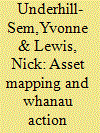

|
|
|
|
|
| Publication |
2008.
|
| Summary/Abstract |
Te Runanga o Te Rarawa is the tribal council representing the interests of the marae (tribal commons) and hapu (a subtribal kin group) that make up the iwi (a Maori tribe) of Te Rarawa in the far north of Aotearoa/New Zealand. In April 2005, officials approached us to help them secure a valuable funding stream tagged to marshalling resources for material development in the area. They sought curriculum vitae and assistance in reframing the funding specifications. Intrigued, armed with a conceptual toolkit drawn from Gibson-Graham's ideas of post-development and asset-based community mapping, and confident that we could add value, we agreed to help. This paper examines the complex politics of our involvement and our changing positioning as researcher subjects. We argue that negotiating a politics of knowledge for projects of this nature requires engagement in complex representational politics of place and divisive identity politics that rage around it. There are no easy protocols for outside researchers, but with appropriate humility and sensitivity to these politics, we can rely on, and should stand up for, the value of our work, which lies in commitments to excellence in scholarship. We cannot and should not seek to control these politics, which will chew us up and spit us out - humanely and with good grace or otherwise. However, good academic work will recognise and adapt to them. In our particular case, we argue that our work had significant value; and in this paper, we trace the production of this value
|
|
|
|
|
|
|
|
|
|
|
|
|
|
|
|
| 2 |
ID:
083844
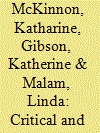

|
|
|
| 3 |
ID:
083851
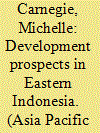

|
|
|
|
|
| Publication |
2008.
|
| Summary/Abstract |
This paper explores the effects of different representations of informal economies in Third World settings. Both the neoclassical and political economy approaches have represented the informal economy as a transient entity, and the non-capitalist practices it comprises as being remnant economic forms, or as already capitalist. Mainstream development discourse (that reflects the neoliberal paradigm) continues to ignore the value and potential of non-capitalist practices and to represent them as inconsequential to development outcomes. Meanwhile contemporary livelihood studies across the social sciences have documented the continuing vibrancy of different and hybrid economic forms in the Asia Pacific. In this paper, I use a diverse-economies approach to explore the complexities of the village economy of Oelua in Rote, in the so-called lagging region of Eastern Indonesia. Drawing on anti-essentialist Marxist theory in economic geography, I describe the multiple, locally specific and coexisting practices that comprise Oelua's diverse economy, which include distributions of surplus labour to promote social and economic well-being. I argue that recognising informal village economies as an important development resource could begin a process of building diverse development trajectories in Eastern Indonesia, complementing mainstream development proposals to attract foreign direct investment, shore up development assistance and source out-migration.
|
|
|
|
|
|
|
|
|
|
|
|
|
|
|
|
| 4 |
ID:
083848


|
|
|
| 5 |
ID:
083850
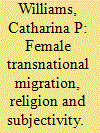

|
|
|
|
|
| Publication |
2008.
|
| Summary/Abstract |
Drawing on an analysis of in-depth interviews with returned migrant women from East Nusa Tenggara, Indonesia, this paper considers the links between migration, religious beliefs and subjectivity. Low-skilled migrant women, including domestic workers, have often been represented as marginalised. This paper argues that in the context of migration, women constantly move through trajectories of power using religion as a spiritual resource. Against the commonly patriarchal characteristics of their religion and community, the women employ cognitive strategies to face challenges in migration. In each stage of their transnational migration, the women's experiences reveal the multitude of ways in which they continue to invest in their beliefs through everyday practices, rituals and networking. These experiences highlight the women's strategies in accessing different forms of power. This study demonstrates the significance of focusing on these women's experiences, including their everyday religious practices and their shifting sense of self, as a way of broadening the conceptual basis of our understanding of female migration
|
|
|
|
|
|
|
|
|
|
|
|
|
|
|
|
| 6 |
ID:
083849
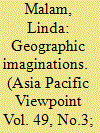

|
|
|
|
|
| Publication |
2008.
|
| Summary/Abstract |
This paper explores contrasting narratives of place meaning in a tourism site in Southern Thailand. Specifically, I analyse the parallel discourses of community change through tourism development embedded in international backpacker narratives, and those of the local Thai elite. By configuring identity and power around binary oppositional categories such as West as economically powerful and dominant/non-West as economically weak and subordinated, 'traditional' tourism studies often locate the dynamics of change in the international tourism industry. To date, there is little research on the very real and important ways that people working in tourism assert agency and understand their own identities in everyday contexts. I argue that local communities can, and often do, shape the changes that tourism development initiates in very creative and adaptive ways.
|
|
|
|
|
|
|
|
|
|
|
|
|
|
|
|
| 7 |
ID:
083852


|
|
|
|
|
| Publication |
2008.
|
| Summary/Abstract |
Donors and aid agencies are now looking to strategies of pro-poor economic growth to raise living standards in developing countries. I critically examine how particular conceptualisations of economy and economic development shape the broader context within which pro-poor growth approaches are implemented by governments and development agencies. While pro-poor growth may expand a national economy, surplus will be distributed in a community and among individuals according to culturally specific logics. To exemplify this point I discuss the community economy of Bomolo on the remote, rural island of Flores, Indonesia. The Ngadha people of Bomolo are identified by the Indonesian state, religious organisations and development agencies as lacking and in need of economic development. Yet in Bomolo, gambling, although illegal and antithetical to development, is fantastically popular, and large amounts of cash surplus are spent on this popular pastime. I argue for more attention to the issue of surplus - the outcome of pro-poor growth. In particular, I propose that surplus distribution is a crucial yet underdeveloped component of the growth equation
|
|
|
|
|
|
|
|
|
|
|
|
|
|
|
|
| 8 |
ID:
083846
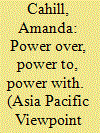

|
|
|
|
|
| Publication |
2008.
|
| Summary/Abstract |
Power has long been recognised as crucial to the sustainability of community development interventions; however, the way in which space affects power relations within such interventions has remained relatively under-theorised in the development literature. Many practitioners continue to regard power as located centrally and as embedded in particular institutions, networks, knowledge and resources. According to this logic, processes of empowerment involve the redistribution of these resources to marginalised groups through their participation in development interventions such as microfinance and sustainable livelihood initiatives. The danger inherent in such development approaches is that they can discourage the potential for participants to use their own agency by overemphasising an existing lack of resources locally and inadvertently feeding a sense of dependency on formal development interventions initiated by external agencies. This paper suggests that a post-structural conceptualisation of power as dynamic, multiple and mediated at the local level offers a more productive starting point for thinking about approaches to empowerment. Drawing on data from an action research project designed to initiate community enterprises in a small rural municipality in the Philippines, I suggest how a post-structural approach to power can be enacted by building on the existing local resources and practices of everyday life.
|
|
|
|
|
|
|
|
|
|
|
|
|
|
|
|
| 9 |
ID:
083845


|
|
|
|
|
| Publication |
2008.
|
| Summary/Abstract |
Emerging post-development literatures consider how post-structural and post-colonial critiques of development could form the basis for new kinds of development practices. Much of the search for such post-development possibilities draws on new theories of discourse. This paper considers the challenges of bringing together empirical research and the experience of doing development with the often ethereal and deeply speculative work of discourse theorists. I reflect on the course taken by my own research in Northern Thailand, and discuss the possibilities that can emerge as theory confronts empirics, and conceptual frameworks are transformed through the daily politics of fieldwork
|
|
|
|
|
|
|
|
|
|
|
|
|
|
|
|
|
|
|
|
|